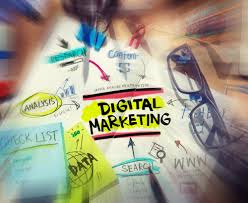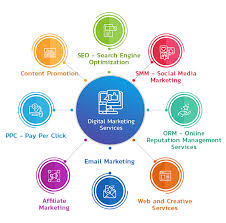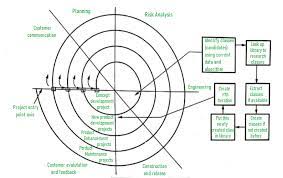The Digital Marketing Engine: Powering Your Online Success
In today’s digital age, having a strong online presence is crucial for businesses of all sizes. To achieve success in the digital realm, it is essential to understand and harness the power of a well-oiled digital marketing engine.
So, what exactly is a digital marketing engine? Think of it as the driving force behind your online marketing efforts. It encompasses a range of interconnected strategies and tactics that work together to attract, engage, and convert your target audience into loyal customers.
At the core of the digital marketing engine lies a comprehensive understanding of your target market. This involves conducting thorough research to identify their needs, preferences, and behaviors. Armed with this knowledge, you can tailor your marketing efforts to resonate with your audience on a deeper level.
Search engine optimization (SEO) plays a vital role in any successful digital marketing engine. By optimizing your website’s content and structure, you can improve its visibility on search engines like Google. This helps drive organic traffic to your site and increases the chances of attracting qualified leads.
Content creation is another crucial component of the digital marketing engine. By producing high-quality and relevant content such as blog posts, articles, videos, or infographics, you can establish yourself as an authority in your industry. Valuable content not only attracts visitors but also keeps them engaged and encourages them to explore more about your brand.
Social media platforms have become powerful tools for businesses to connect with their target audience. An effective social media strategy forms an integral part of the digital marketing engine. By creating compelling content tailored for each platform and engaging with users through comments and discussions, you can build brand awareness, foster customer relationships, and drive traffic back to your website.
Paid advertising is another crucial cog in the digital marketing engine. Platforms like Google Ads or social media advertising allow businesses to reach their target audience directly through targeted ads. With careful planning and optimization based on data analysis, paid advertising can yield significant returns on investment.
Analytics and data-driven insights are the fuel that keeps the digital marketing engine running smoothly. By tracking key metrics such as website traffic, conversion rates, and user behavior, you can gain valuable insights into what works and what doesn’t. These insights enable you to make informed decisions and continuously optimize your marketing efforts for better results.
In conclusion, a well-designed and well-executed digital marketing engine is essential for businesses aiming to thrive in the online landscape. By understanding your target audience, leveraging SEO techniques, creating compelling content, harnessing the power of social media, utilizing paid advertising effectively, and analyzing data-driven insights, you can propel your online success to new heights. So gear up your digital marketing engine and watch as it drives your business forward in the ever-evolving digital world.
5 Essential Tips to Boost Your Digital Marketing Engine
- Understand Your Audience
- Leverage Automation Tools
- Focus on Quality Content
- Utilize Paid Advertising
- Track & Analyze Data
Understand Your Audience
One of the most crucial tips for a successful digital marketing engine is to understand your audience. In the vast online landscape, knowing who your target audience is and what they want is essential for crafting effective marketing strategies.
Understanding your audience goes beyond basic demographics. It involves delving deeper into their preferences, needs, pain points, and behaviors. By conducting thorough market research and analyzing data, you can gain valuable insights that will shape your digital marketing efforts.
When you truly understand your audience, you can tailor your messaging to resonate with them on a personal level. You can create content that addresses their specific challenges or offers solutions to their problems. This targeted approach not only captures their attention but also builds trust and credibility.
Moreover, understanding your audience allows you to choose the right channels and platforms to reach them effectively. Different demographics may prefer different social media platforms or online communities. By identifying where your target audience spends their time online, you can focus your efforts on those channels and maximize your reach.
Understanding your audience also helps in optimizing user experience on your website or app. By analyzing user behavior data, you can identify areas for improvement and make necessary adjustments to enhance the overall user experience. This leads to higher engagement rates, increased conversions, and ultimately more satisfied customers.
In conclusion, understanding your audience is a fundamental aspect of any successful digital marketing engine. It enables you to create tailored content that resonates with your target audience, choose the right channels for effective communication, and optimize user experience for better results. So take the time to research and analyze who your audience is – it will be the foundation of a powerful digital marketing strategy that drives success for your business in the online world.
Leverage Automation Tools
Leverage Automation Tools: Streamlining Your Digital Marketing Engine
In the fast-paced world of digital marketing, time is of the essence. To maximize efficiency and productivity, it’s crucial to leverage automation tools as part of your digital marketing engine.
Automation tools are software applications designed to streamline repetitive tasks and workflows, allowing marketers to focus on strategic initiatives. These tools can be game-changers, saving you valuable time and effort while ensuring consistent execution of your marketing campaigns.
One area where automation tools excel is email marketing. Instead of manually sending individual emails, you can use email automation platforms to create personalized email sequences triggered by specific actions or events. This not only saves time but also enables you to nurture leads and engage with customers in a targeted and timely manner.
Social media management is another area where automation tools shine. With social media scheduling tools, you can plan and schedule your posts in advance across various platforms. This allows you to maintain a consistent presence online without having to manually post content every day.
Automation tools also play a significant role in customer relationship management (CRM). By integrating your CRM system with automation software, you can automate lead nurturing processes, track customer interactions, and segment your audience for more targeted marketing campaigns. This ensures that no potential leads fall through the cracks and helps you build stronger relationships with your customers.
Additionally, analytics and reporting can be made easier through automation tools. Instead of spending hours crunching numbers and creating reports manually, analytics platforms can automatically gather data from various sources and generate comprehensive reports. This saves time while providing valuable insights into the performance of your digital marketing efforts.
However, it’s important to note that while automation tools are powerful assets, they should not replace human creativity or strategic thinking. They should be used as enablers rather than replacements for human touchpoints in your digital marketing strategy.
In conclusion, leveraging automation tools is an essential tip for optimizing your digital marketing engine. By automating repetitive tasks, you can save time, improve efficiency, and ensure consistent execution of your marketing campaigns. Whether it’s email marketing, social media management, CRM, or analytics and reporting, automation tools offer a range of benefits to streamline your digital marketing efforts. Embrace these tools as valuable allies in your quest for online success.
Focus on Quality Content
In the vast realm of digital marketing, one tip that consistently stands out is the importance of focusing on quality content. In an era where attention spans are dwindling, and competition for online visibility is fierce, producing high-quality content has become a key differentiator.
Quality content serves as the backbone of any successful digital marketing engine. It not only helps you attract and engage your target audience but also establishes your brand as a trusted authority in your industry. By providing valuable information, insights, or entertainment through your content, you can build credibility and foster lasting relationships with your customers.
When it comes to creating quality content, it’s essential to understand your audience’s needs and preferences. Conduct thorough research to identify their pain points, interests, and questions. By addressing these directly in your content, you can position yourself as a reliable source of information that resonates with your target market.
The format of your content can vary depending on your audience and industry. It could be blog posts, articles, videos, podcasts, infographics – the possibilities are endless. The key is to choose formats that align with both your brand identity and the preferences of your audience.
Remember that quality goes beyond just well-written text or visually appealing design. Your content should be informative, engaging, and provide real value to readers or viewers. It should answer their questions or solve their problems while keeping them captivated throughout their journey with your brand.
Optimizing your content for search engines is also crucial for its success. By incorporating relevant keywords naturally into your content and ensuring proper formatting and structure, you increase the chances of ranking higher in search engine results pages (SERPs). This improves visibility and drives organic traffic to your website.
Furthermore, quality content serves as a magnet for social media engagement. When people find value in what you share, they are more likely to share it with others on platforms like Facebook, Twitter, or LinkedIn. This amplifies the reach of your content and exposes your brand to a wider audience.
Lastly, don’t underestimate the power of storytelling in your content. Humans are naturally drawn to narratives, and weaving compelling stories into your content can make it more memorable and impactful. Whether it’s sharing customer success stories or narrating your brand’s journey, storytelling adds an emotional element that resonates with your audience on a deeper level.
In conclusion, focusing on quality content is a fundamental pillar of any successful digital marketing engine. By understanding your audience, providing value through informative and engaging content, optimizing for search engines, leveraging social media engagement, and incorporating storytelling techniques, you can create a powerful digital presence that sets you apart from the competition. So invest in quality content creation and watch as it fuels the growth of your brand in the dynamic digital landscape.
Utilize Paid Advertising
Utilize Paid Advertising: Accelerate Your Digital Marketing Engine
In the vast digital landscape, standing out from the competition can be a challenge. That’s where paid advertising comes into play, acting as a turbocharger for your digital marketing engine. By strategically investing in paid advertising, you can reach your target audience more effectively and achieve faster results.
Paid advertising offers businesses the opportunity to display targeted ads across various platforms such as search engines, social media channels, or websites. It allows you to place your brand directly in front of potential customers who are actively searching for products or services like yours.
One of the key benefits of paid advertising is its ability to deliver immediate visibility. Unlike organic methods that take time to gain traction, paid ads can generate instant exposure for your business. This is especially valuable when launching new products or promoting limited-time offers.
Platforms like Google Ads enable businesses to bid on keywords related to their industry and display ads at the top of search engine results pages. This ensures that your brand appears prominently when potential customers are actively searching for relevant information. By targeting specific keywords and demographics, you can narrow down your audience and increase the chances of attracting qualified leads.
Social media platforms such as Facebook, Instagram, or LinkedIn also offer robust paid advertising options. These platforms provide detailed targeting capabilities based on users’ interests, demographics, and behaviors. This allows you to tailor your ads to reach a highly specific audience that is more likely to engage with your brand.
Paid advertising provides measurable results through data analysis and tracking tools. You can monitor key metrics such as impressions, clicks, conversions, and return on investment (ROI). This valuable data helps you understand which campaigns are performing well and where adjustments may be needed. With this information in hand, you can continuously optimize your ad campaigns for better results over time.
It’s important to note that while paid advertising offers many advantages, it requires careful planning and execution. Setting clear objectives, defining your target audience, and crafting compelling ad copy are crucial steps to maximize the effectiveness of your campaigns. Regular monitoring and optimization are also essential to ensure that you’re getting the most out of your advertising budget.
In conclusion, paid advertising is a powerful tool that can significantly boost your digital marketing engine. By investing strategically in targeted ads, you can increase brand visibility, attract qualified leads, and accelerate your business growth. So don’t hesitate to utilize paid advertising as a valuable component of your overall digital marketing strategy and watch as it propels your success in the competitive online landscape.
Track & Analyze Data
Track & Analyze Data: The Key to Unlocking Digital Marketing Success
In the fast-paced world of digital marketing, data is the key to unlocking success. Tracking and analyzing data allows businesses to gain valuable insights into their online marketing efforts and make informed decisions for better results.
Tracking data involves monitoring various metrics related to your website, social media channels, email campaigns, and other digital marketing initiatives. By implementing tracking tools such as Google Analytics, you can gather valuable information about user behavior, traffic sources, conversion rates, and more.
Analyzing this data is where the real magic happens. It enables you to understand what’s working and what’s not in your digital marketing strategy. By spotting trends, identifying bottlenecks, and recognizing opportunities, you can fine-tune your approach and maximize your return on investment.
One of the primary benefits of tracking and analyzing data is that it allows you to measure the effectiveness of your campaigns. You can see which channels are driving the most traffic or conversions, helping you allocate resources strategically. This way, you can focus on high-performing channels while making adjustments or even discontinuing underperforming ones.
Data analysis also helps in understanding your target audience better. You can gain insights into their demographics, preferences, online behavior, and purchasing patterns. Armed with this knowledge, you can tailor your marketing messages more effectively to resonate with your audience on a deeper level.
Moreover, tracking and analyzing data empowers you to optimize your website’s performance. By examining user flow and behavior on your site, you can identify areas that need improvement or optimization. This could involve streamlining navigation paths or enhancing page load speeds – all aimed at providing a better user experience that leads to higher conversions.
Another advantage of data analysis is its ability to uncover untapped opportunities. By identifying patterns or trends in consumer behavior or market demand through data analysis, you can discover new niches or target segments for expansion. This insight can guide your marketing efforts and help you stay ahead of the competition.
In summary, tracking and analyzing data is an essential tip for any business looking to succeed in the digital marketing realm. By harnessing the power of data, you can gain valuable insights into your audience, measure campaign effectiveness, optimize your website’s performance, and uncover new opportunities. So, make data tracking and analysis an integral part of your digital marketing engine and watch as it propels your business to new heights of success.




